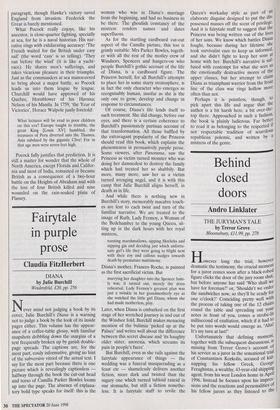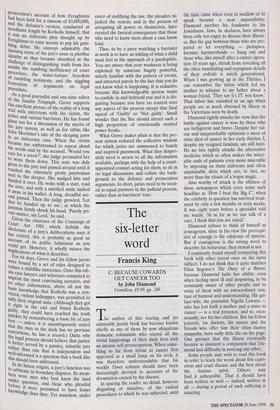Behind closed doors
Andra Linklater
THE JURYMAN'S TALE by Trevor Grove Bloomsbury, £11.99, pp. 278
Imo
However long the trial, however dramatic the testimony, the crucial moment for a juror comes soon after a black-robed figure clicks the door of the jury room shut, but before anyone has said 'Who shall we have for foreman?' or, 'Shouldn't we order the sandwiches now, so they'll be ready for one o'clock?' Coinciding pretty well with the process of taking one of the 12 chairs round the table and spreading out your notes in front of you, comes a strobe-lit millisecond of exultation, which if it had to be put into words would emerge as, 'Ahal It's my turn at last!' Unfortunately that defining moment, i together with the subsequent discussions, s missing from Trevor Grove's account of his service as a juror in the sensational trial of Constantinos Korkolis, accused of kid- napping his fellow Greek, George Feraghistas, a wealthy, 43-year-old shipping agent, from his west London home in April 1996. Instead he focuses upon his impres- sions and the reactions and personalities of his fellow jurors as they listened to the prosecution's account of how Feraghistas had been held for a ransom of $3,000,000, and the defence's version, conducted at inordinate length by Korkolis himself, that it was an elaborate ploy thought up by Feraghistas to raise money to pay his gam- bling debts. He conveys admirably the dawning sense of the jury's unus ex pluribus identity as they became absorbed in the challenge of distinguishing truth from lies amidst the numbing inefficiency of court procedure, the water-torture boredom of rambling testimony, and the niggling frustration of arguments on legal procedure.
As a good journalist and one-time editor of the Sunday Telegraph, Grove supports this excellent picture of the reality of a long trial with interviews with the victim, the police and various barristers. He has found place too for a discussion of the merits of the jury system, as well as for titbits like John Mortimer's tale of the sleeping juror in an indecency case. When the victim became too embarrassed to repeat aloud the words said by the accused, 'Would you care for a screw?', the judge persuaded her to write them down. This note was duly given to the jury and passed around until it reached the extremely pretty jurywoman next to the sleeper. She nudged him and handed it over. He woke with a start, read the note, and with a satisfied smile tucked it away in his wallet. A long, dreadful sec- ond passed. Then the judge growled, 'Let that be handed up to me', at which the Juryman firmly shook his head. 'Purely pri- vate matter, my Lord,' he said. Given the existence of the Contempt of Court Act 1981 which forbids the disclosure of a jury's deliberations once it has retired, this is probably as good an account of its public behaviour as you Could get. However, it wholly misses the implications of what it describes. For 64 days, Grove and his fellow jurors were bound by a set of rules designed to induce a childlike innocence. Onto this tab- ula rasa lawyers and witnesses competed to imprint the most convincing scenario, and no other information, above all not the basic knowledge that Korkolis was a con- victed, violent kidnapper, was permitted to sully their virginal state. (Although they got it right in the end and found Korkolis guilty, they could have reached the truth quicker by remembering a basic bit of jury lore — unless it is unambiguously stated that the man in the dock has no previous convictions he has a record.) Quite why the legal process should believe that justice is better served by a passive, infantile jury rather than one that is independent and well-informed is a question that a book like this should have addressed. In its Saxon origins, a jury's function was to arbitrate in boundary disputes. Its mem- bers were men who best knew the land under question, and those who pleaded before it were presumed to have lesser knowledge than they. Yet somehow, under cover of codifying the law, the pleaders hi- jacked the system, and in the process of arrogating all power to themselves, have created the farcical consequence that those who need to know most about a case know least.
Thus, to be a juror watching a barrister at work is to have an inkling of what a child must feel at the approach of a paedophile. You are aware that your weakness is being exploited by someone hugely powerful, utterly familiar with the pattern of events, and attracted purely by the fact that you do not know what is happening. It is seductive because this knowledgeable person wants to confide in and befriend you and it is dis- gusting because you have no control over any aspect of the process except that final squeal of 'Guilty' or 'Not guilty'. Small wonder that the Bar should attract such a high proportion of emotionally stunted power freaks. What Grove makes plain is that the pre- sent system reduced the collective wisdom for which juries are summoned to hunch and inspired guesswork. What they desper- ately need is access to all the information available, perhaps with the help of a court- appointed counsel acting for them, to sit in on legal discussions and collate the back- ground to the defence and prosecution arguments. In short, juries need to be treat- ed as equal partners in the judicial process, rather than as barristers' toys.



























































 Previous page
Previous page